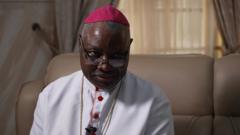
Abuja Archbishop Discusses Papal Succession Process
The selection of the next Pope is a matter of intense interest and speculation within the Catholic Church and beyond. Recently, the Archbishop of Abuja, Nigeria, engaged in a conversation with the BBC, shedding light on the complex and often secretive process by which the College of Cardinals chooses the successor to Saint Peter.
The Conclave: A Sacred Tradition
At the heart of papal succession lies the Conclave, a centuries-old tradition steeped in ritual and solemnity. This gathering of Cardinals, typically held within the confines of the Sistine Chapel in Vatican City, is where the future leader of the Catholic Church is elected.
Who Participates in the Conclave?
Only Cardinals under the age of 80 at the time of the Pope's death or resignation are eligible to participate in the Conclave. This age restriction, introduced by Pope Paul VI, aims to ensure that those electing the next Pope possess the energy and vitality required for such a weighty decision.
Secrecy and Isolation
One of the defining characteristics of the Conclave is its strict adherence to secrecy. Cardinals are sequestered from the outside world, forbidden from communicating with anyone beyond the walls of the Vatican. This isolation is intended to prevent external influences or pressures from swaying their votes, allowing them to discern God's will in an atmosphere of prayer and reflection.
The Voting Process: Ballots and Smoke Signals
The election of a new Pope is conducted through a series of ballots. Cardinals cast their votes in secret, writing the name of their chosen candidate on a slip of paper. These ballots are then collected and counted. A two-thirds majority is required for a candidate to be elected Pope.
Black Smoke and White Smoke
Perhaps the most visible symbol of the Conclave is the smoke that billows from the chimney of the Sistine Chapel. If no candidate receives the required two-thirds majority, the ballots are burned, and black smoke is released, signaling to the world that the Cardinals have not yet reached a decision. When a Pope is successfully elected, the ballots are burned, and white smoke is released, announcing "Habemus Papam" – "We have a Pope."
Factors Influencing the Cardinals' Decision
While the Conclave is intended to be a process guided by prayer and divine inspiration, several factors inevitably influence the Cardinals' decision-making process.
- Theological Perspectives: Cardinals often hold differing theological views, which can play a significant role in their choice of a candidate who aligns with their own understanding of Catholic doctrine.
- Geopolitical Considerations: The Cardinals may also consider the global landscape and the challenges facing the Church in different regions when selecting a Pope who is best equipped to address these issues.
- Leadership Qualities: The Cardinals will undoubtedly assess the leadership qualities of the candidates, looking for someone with the vision, wisdom, and pastoral skills necessary to lead the Church in the 21st century.
The Role of the Archbishop of Abuja
The Archbishop of Abuja's insights into the papal selection process are particularly valuable, given his position as a prominent leader within the Catholic Church in Nigeria, a country with a rapidly growing Catholic population. His perspective offers a glimpse into the considerations and priorities that may be at play as the Cardinals prepare to choose the next Pope.
Potential Candidates: A Matter of Speculation
The identity of potential candidates for the papacy is always a subject of intense speculation. While the Cardinals are bound by secrecy and are reluctant to discuss potential candidates publicly, various names are often mentioned in media reports and theological circles. However, it is important to remember that the ultimate decision rests solely with the College of Cardinals during the Conclave.
The Future of the Catholic Church
The election of the next Pope will have a profound impact on the future of the Catholic Church. The new Pope will be tasked with guiding the Church through a period of significant challenges, including declining membership in some regions, ongoing controversies related to sexual abuse, and the need to address social justice issues such as poverty, inequality, and climate change.
The Importance of Prayer
As the Catholic Church prepares for the possibility of a new papal election, the importance of prayer cannot be overstated. Catholics around the world are encouraged to pray for the Cardinals, that they may be guided by the Holy Spirit in their deliberations and that they may choose a Pope who will lead the Church with wisdom, compassion, and courage.
